Bequest Leads to Deep Rift for Nixon Kin
In the eight years since President Richard M. Nixon was laid to rest on a Yorba Linda hillside, his two daughters have been embroiled in a bitter dispute over how best to showcase the legacy of the only man to resign from the U.S. presidency.
Now the quiet feud has spilled into open court, as the sisters battle over a $12-million bequest from Nixonâs longtime friend, the late Bebe Rebozo.
For the record:
12:00 a.m. March 20, 2002 FOR THE RECORD
Los Angeles Times Wednesday March 20, 2002 Home Edition Main News Part A Page 2 A2 Desk 2 inches; 41 words Type of Material: Correction
Nixon--A story in Section A on Friday about a feud between President Richard Nixonâs two daughters misspelled the name of a member of the Nixon Libraryâs board of directors. Itâs Kenneth L. Khachigian. The story also incorrectly stated the year Nixon moved into the White House. It was 1969.
At stake is not just the money, but how Nixonâs memory will be preserved. The dispute grows out of the sistersâ sharply divergent views over whether the Nixon Library & Birthplace Foundation, the beneficiary of Rebozoâs bequest, should be operated by the family or by an independent board of directors.
On one side is Julie Nixon Eisenhower, who fought as a young woman alongside her father as he faced a national storm over Watergate. On the other side is Tricia Nixon Cox, whose White House wedding made the cover of Time but who shared her motherâs cool reserve. And in the middle is the largess of Rebozo, a Miami businessman whose friendship with the president brought him more attention than he liked--including investigations into campaign contributions.
Until now, Eisenhowerâs vision has prevailed, with the Yorba Linda library--and its assets--overseen by a 24-member board that includes the sisters and such former Nixon White House figures as Henry Kissinger and Kenneth L. Kachigian.
But terms of Rebozoâs $12-million bequest have given Cox an opening to try to wrest control of the money--which would double the foundationâs endowment--from the board.
In lawsuits filed in Orange County and in Miami earlier this year, the Nixon Foundation is seeking to head off Cox and to oust her from a three-person board that Rebozoâs will established to oversee the bequest. With its legal action, the foundation hopes to finally free up the money, most of which has been tied up in probate because of the dispute.
The roots of the dispute go back to a struggle between the sisters after Nixonâs death over the degree of control the family should have over the foundation.
âIn 1997, Mrs. Eisenhower went down one road and Mrs. Cox went down the other,â said John H. Taylor, executive director of the Nixon library. âThis has been a very, very difficult path for Mrs. Eisenhower to walk. She had to take a step . . . which caused members of her own family to be angry with her. That was not easy.â
Another director--and Eisenhower ally--was more blunt: âThereâs a complete estrangement between the sisters,â the director said, asking that he not be identified.
Neither of the sisters could be reached for comment, and their attorneys declined to discuss the case.
The court filings are an attempt by the foundation to break the deadlock between the two sisters by pushing Cox aside.
âWeâre essentially asking the Rebozo trust in Miami to go ahead and send us the money,â Taylor said. âWhat is clear is that Mr. Rebozo wanted it to go to the foundation endowment in perpetuity, and weâre asking the court to make that happen.â
The heart of the dispute predates Rebozoâs death, said Dimitri Simes, president of the Nixon Center in Washington, D.C., which is also supported by the foundation.
âWhat weâre dealing with is a long-standing dispute among members of the Nixon Foundation over the intent of the former president,â said Simes, who is on the board. âWhat was supposed to be the role of the foundation and the mission of the foundation--and accordingly, how the foundation was supposed to be governed?â
At the time of Nixonâs death in 1994, the foundation was loosely overseen by a group of six Nixon friends. The group decided after Nixonâs death that the foundation needed a more formalized board structure.
Cox and her husband, lawyer Edward Cox, lobbied for a board that would be controlled by the Nixon family; Eisenhower aligned herself with those who sought a more independent board. Eisenhower prevailed.
Then came the Rebozo bequest.
Rebozo, who made millions in Florida real estate and other ventures, was one of Nixonâs closest friends for more than 40 years--a friendship that both men said was steeped more in their love for a good steak than in politics.
When Rebozo died four years ago, he left 65% of his estate--with a total current value as high as $19 million--to the Nixon Library under the caveat that all expenditures be approved by Nixonâs daughters and another longtime Nixon friend, Robert Abplanalp.
But the two sisters have been unable to agree on how the money should be controlled, leaving the estate tied up in Florida probate court.
The feud flared up last year when Cox refused to sign a complex legal agreement, which her sister and Abplanalp signed, that would send the money to the foundationâs permanent endowment and limit spending to 5% per year.
Cox countered with her own proposal that would give the sisters and Abplanalp the power to distribute the money, including to outside charities, unless the foundation board met to overrule such a decision within 60 days--a difficult task given how far-flung the board members are. There is no overt provision allowing any personal use of the donation.
Eisenhower and the rest of the foundation rejected Coxâs proposal, and in January they took the issue to court, describing the situation as a hopeless stalemate that threatened to deprive the library of millions of dollars.
Cox, who lives in New York, has challenged the California courtâs jurisdiction and asked that the dispute be handled by the Florida probate court.
âPermitting the two separate proceedings to proceed simultaneously in two separate states . . . risks inconsistent judgments,â Coxâs lawyer, Thomas Malcolm, said in court documents.
Attorneys for the Rebozo trust, who did not return a phone call seeking comment, also have argued that Orange County courts do not have jurisdiction. The trust paid $780,000 to the foundation in 1999 but has vowed to hold on to the rest of the money unless the sisters reach an agreement. It hasnât sided with either of the sisters.
The argument is a rare public airing of a sibling spat. Cox, the elder of the sisters, was born in February 1946, nine days after her father, then a Whittier lawyer, declared he was running for Congress. Eisenhower was born two years later, as Nixon ran for reelection.
Over the next quarter century, the girls grew up as their father became one of the most powerful men in the world--and one of the most controversial--as he moved from being President Dwight Eisenhowerâs vice president in the â50s into the White House himself in 1968.
In 1968, the Eisenhower and Nixon families, already linked by politics, merged with the marriage of Julie Nixon and David Eisenhower, the former president and war heroâs grandson. Three years later, Tricia married Edward Cox in the Rose Garden in a ceremony that took on some of the aura of a royal wedding.
The sisters, though, pursued divergent paths. Eisenhower was active in her fatherâs campaigns. After he resigned in 1974, she served as an editor of the Saturday Evening Post and wrote five books.
Although Cox stayed largely out of the limelight, the recent legal filings threaten to pull her into the public venue of a courtroom as the foundation seeks to break the deadlock between them. And the fractious dispute marks a disharmonious footnote to what was the unlikely friendship between the reserved president and the colorful Rebozo.
The men met while Nixon was a senator from California, and a friend asked Rebozo to entertain him. Rebozo took Nixon out fishing on his boat, the Cocolobo. Nixon, who was never much of a fisherman, took a pile of papers. As Rebozo fished, Nixon worked, and the seeds of their relationship were sown.
Rebozo was with Nixon on the eve of his resignation, and when the former president died, Rebozo was there for the final rites. At the burial, he was seated directly behind the two women now fighting over his final gift to his friend.
*
Times staff writer Phil Willon contributed to this report.
More to Read
Sign up for Essential California
The most important California stories and recommendations in your inbox every morning.
You may occasionally receive promotional content from the Los Angeles Times.










